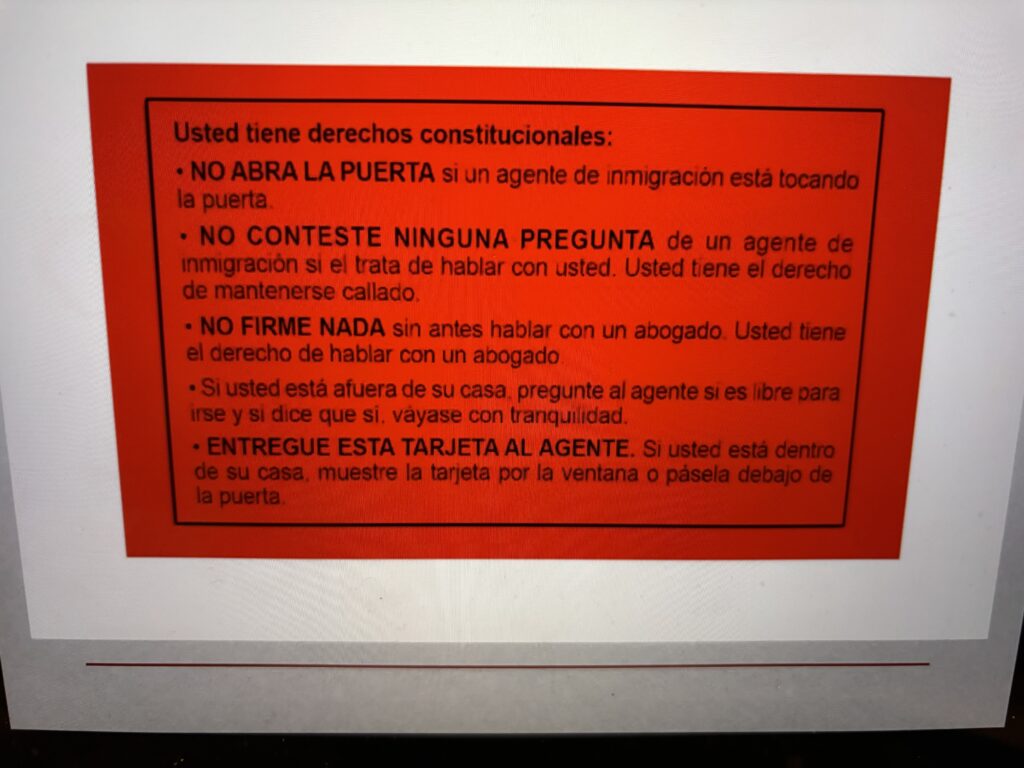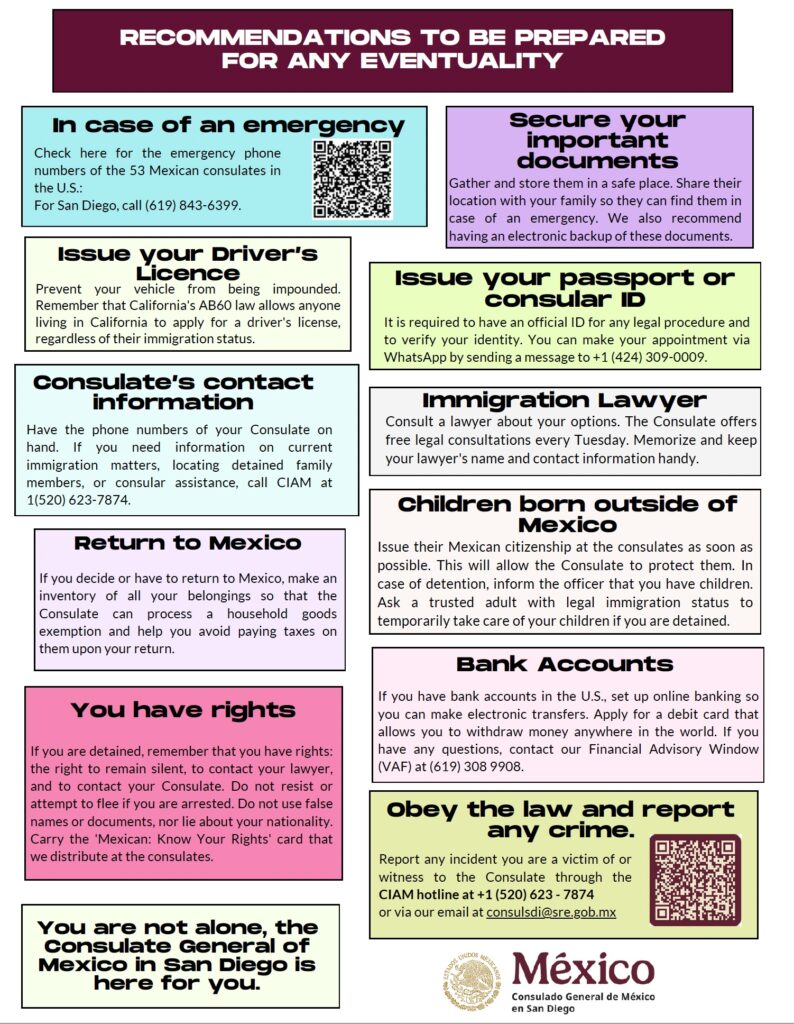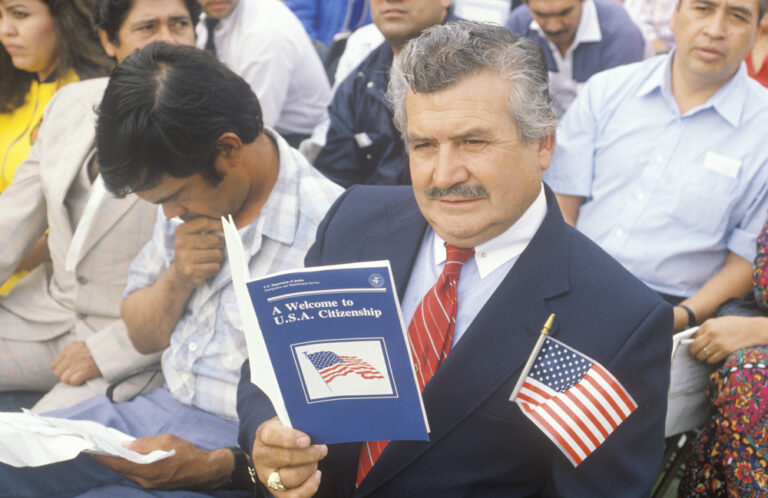By NCI
As our communities face new legal and immigration challenges, it is essential to stay informed.
“It’s super important to stay informed, educated, so we can be ready, organized, “says Dr. Villarreal, the director of Mano a Mano Foundation. It’s important to “let the community know…give them the resources that really work from sources they can trust.”
Maru Mora Villalpando, a grassroots organizer with La Resistencia explains that Trump has demanded an increase in immigrant arrests. “ICE has changed the dates on its website to make it seem that arrests have just happened” says Mora Villalpando. “It’s more about the theatrics and optics of it…and the dehumanization of people.”
“It’s a message of power, not panic,” ‘says Amanda Alvarado Ford, an immigration lawyer in the San Francisco Bay Area. “Undocumented people in the US are entitled to constitutional protections.”
“ICE can go into any city to enforce federal law,” says Oscar Sarabia Roman, a staff attorney with the ACLU. “But what they can’t do is force local officials to enforce federal immigration law. They need a judicial warrant.”
Can Local Law Enforcement Arrest Me?
In California, local law enforcement, including the police and sheriffs, are legally prohibited from helping ICE.
San Diego County Sheriffs reassure the community that they do not work with immigration agents. Captain Aldo Hernandez, of the sheriffs in Santee and Lakeside, says on behalf of Sheriff Kelly Martinez’s office, “The responsibility of enforcing immigration law rightfully falls on federal agencies. We are a local agency, and we only enforce California state laws.” Furthermore, California Senate Bill 54, also known as SB54, says that local police will not enforce federal immigration law. “By law, we cannot enforce it,” Hernandez says.
This point is of utmost importance because communities can and should continue to report crimes to local officials. “If someone calls us because they are a victim of a crime, we will never ask them their immigration status,” Hernandez says.
“Our only communication and collaboration with federal agents is what the sheriff points to as our greatest success, which is keeping our communities safe,” he says. For this reason, if you witness crimes of theft, domestic violence, drugs or others in your communities, you are asked to report them to the local police. There are in no danger regarding immigration, and this way the communities remain safe.
On behalf of San Diego County Sheriff Kelly Martinez, Hernandez read her statement: “We do not participate in immigration raids. We do not communicate with them. We do services independent of what they do. If you see us on the streets, we are just doing our job, which is completely different. There is a lot of panic in the communities right now.”
Dr. Villarreal adds, “If you witness a crime, you have to talk to the police. They will support you. They will not call immigration. … I’ve worked very hard with the sheriffs to earn the trust of the community and work with the sheriffs.”
What Does the Law Say?
Immigration attorney Eduardo Perez, the son of immigrants and a former police officer, former prosecutor, and former criminal defense attorney, explains why there is so much panic. President Trump challenged ICE to catch 1,000 undocumented people every week. If they don’t find 1,000 undocumented people with criminal records, they will go after all undocumented people without criminal records to meet their quota of 1,000 arrests.
Perez explains ICE’s limits.
ICE shows up dressed as civilians and wearing jackets with insignia that says ICE Police. But they are not police officers. “They are using that name to gain respect, to give them authority in the community,” says Perez. “In reality, they are not authorities like a police officer. They’re administrative officials. Being undocumented in the United States is a civil violation, not a penal one, not a criminal one.”

Administrators of schools, churches, hospitals and the like are not required to cooperate in raids because ICE are civil authorities, not criminal. A police officer has the right to enter by force. ICE does not.
An arrest warrant must name a specific person and describe that person—gender, age—and have the signature of a federal judge from the Federal Circuit Court in San Diego, not the signature of an ICE supervisor. “They take advantage of people’s ignorance and kindness and fear,” says Perez. “You have to investigate whether an order is legit.”

Perez explains that taking someone out of the country without a legal process is considered kidnapping. Still, these days, rights are being abused. For this reason, we must know our rights well and not allow abuses.
If you are stopped randomly while driving, you do not have to cooperate. If you are stopped, a lawyer can get you off because the stop was illegal, but if you say anything, you can lose that right, Perez explains. For this reason, it is essential that you exercise your right to remain silent. “You do not have to answer to the police, even your name, without suspicion of a crime that you have committed, without a court order signed by a judge,” says Perez.
He explains that ICE is trying to intimidate people, but you can ask, “Am I free to go or am I under arrest?” If ICE responds that you are under arrest, remain silent and follow the rules for arrests. If you are not under arrest, you can walk away.
If ICE detains you illegally (without a warrant signed by a judge), you can fight it in the future, but only if you remain silent and do not sign anything.
If you lie and say you are a citizen and you are not, you are banned from entering the country for life, even if you are already well into the naturalization process, so it is essential to remain silent.
If you are detained, you have the right to speak to a lawyer, even if it is not right away. If you or a family member calls a lawyer about a detained person, it is important to know the 9-digit case number. The lawyer can then find it in the system.
You have the right to consult with a lawyer, but this right is not free. The Immigration Court has a list of pro-bono lawyers, and the county has some assistance programs. It is important to remember that, in California, a notary is not a lawyer. They cannot resolve legal situations.
What Are Some Tips?
If ICE knocks on your door, you are not required to open the door.
Stay calm. Do not run away. Remain silent.
Do not sign anything without speaking to a lawyer. There is no consequence for not signing, even if they try to intimidate you.
Do not reveal your immigration status. Do not lie or show false documents.
Ask to see the warrant through the window of your home or vehicle. Check what type of document they are showing. Check your name and address and that it is signed by a judge. Take your time.
If they show a warrant, listen to what they say. The warrant must have your full, correct name, address, and description, and be signed by a US District Court judge.
If they do not have a warrant signed by a judge, you can deny them access to your home. You should not open the door. The ICE I-205 form does NOT give them permission to enter your home.
If you are detained:
Remain silent.
Once in detention, contact your lawyer. You have the right to get one if you don’t have one already.
Contact your consulate.
Do not sign anything you don’t understand; ask for a translator or the document in Spanish.
Find out which agency detained you: local police, ICE, sheriff, Border Patrol (for any crime).
Request an interpreter and bail.
Explain if you are afraid to go back to your home country or if you’ve been in the United States for more than 2 years. If an undocumented person has been in the United States for more than two years, he or she has the right to a hearing before being removed. Therefore, you should keep receipts and copies on your phone that prove you have been here for at least that long.
En general:
Do not drink and drive, get involved in family disputes, or commit any crime so you won’t have an arrest warrant out for you.
Print “red cards” that state your rights and carry them with you.

There are also visas for domestic violence (U Visa), trafficking (T Visa).
Can ICE Arrest Me at Work or School?
“At work, ICE cannot access private spaces, only public spaces like reception,” says Alvarado Ford. Employers can put up signs marking clearly which spaces are private for employees, and ICE can be denied entrance without a signed warrant.
Meanwhile, “Some parents have already withdrawn their kids from school,” says Viridiana Carrizales, the cofounder and chief executive officer of ImmSchools. She notes that there are 5.5 million students in K-12 in the United States who are US citizens and have at least one undocumented parent.
In the landmark 1982 decision Plyler vs. Doe, it was determined that every child in this country regardless of their immigration status and regardless of their parents’ immigration status has the legal right to be in K–12 schools.” A school cannot ask for information on student or parent immigration status. Immigration officials can only enter a school with a signed judicial warrant for a specific person.
Can the Mexican Consulate Help Me?
Adriana Soto Yanez, the Consul for Protection and Legal Affairs of the Mexican Consulate in San Diego, explains how the consulate can help Mexicans in San Diego. “It is important to be informed by reliable, trustworthy government sources.”

Her advice to ICE and other authorities is the same as that of other organizations, such as remaining silent, asking to see the order, and contacting a lawyer.
She adds that Mexican nationals should carry the information and phone number of the consulate with them.
If a Mexican citizen is arrested, they have the right to contact the Mexican consulate. There is also a Mexican Assistance Information Center (CIAM) to inquire about the whereabouts of family members: 52-0623-7874.
She recommends that Mexicans apply for their Mexican passport and consular registration so that the consulate can provide protection. They can do so at the Consulate in San Diego.
They can also get their children dual nationality so that they also get support from the Mexican government.
It is recommended to keep in a safe, accessible place information about any immigration procedures they’re working on with lawyer, as well as the name and phone number of the lawyer. Share the location of these documents with a family member, and keep an electronic backup of the documents, a photograph on your cell phone, or a photocopy.
There are free consultations every Tuesday at the consulate: https://consulmex.sre.gob.mx/sandiego/
619-843-6399
Customer Service Center: 52-0623-7874.
What Happens to My Kids?
If you are deported or choose to leave the country, minor children who are citizens may stay in the United States. A letter notarized by a notary public in San Diego County can specify the person who will care for your children in case of emergency (that person must have legal status in the United States) and decide for your children in medical, school, and personal, and legal matters. Notaries are available at banks for official verification of signatures.
Craft an emergency plan with your loved ones including plans for guardianship of dependents: https://www.ilrc.org/resources/step-step-family-preparedness-plan
What About My Money and Assets?
If you have bank accounts in the United States, “make sure you can access them in case of an emergency through the online application,” says the consul. “And that you can withdraw money anywhere from Mexico.”
You can keep your debit and credit card information in your Virtual Wallet on your smartphone. Sign up for mobile banking and make sure your bank offers cardless cash withdrawal.
If you decide to return to Mexico, you can ask the consulate for an inventory of all your belongings in the United States. It is called a household item inventory and exempts you from paying taxes for bringing your belongings to Mexico.
The ACLU Has Detailed Information about What You Should Do in Most Situations

The ACLU has a web page with very detailed information about what your rights are in many situations, including arrest in a car, at the border, on a bus, and much more. Please check the ACLU page: https://www.aclu.org/know-your-rights/immigrants-rights
“The fundamental constitutional protections of due process and equal protection embodied in the U.S. Constitution and Bill of Rights apply to every person, regardless of immigration status,” said Brisa Velazquez Oatis, immigrants’ rights staff attorney at the ACLU of San Diego & Imperial Counties. “It is essential to know your rights. People who are informed can better protect themselves, their families and their communities.”
These new immigration mandates are an “Attack on communities, the US Constitution, and our fundamental American values,” says Sarabia Roman, a staff attorney with the ACLU.
Sarabia Roman notes, that the ACLU is fighting with lawsuits the attacks on 14th amendment rights (children born in the United States are automatically US citizens); denial of healthcare and nutrition, blocking of asylum applications at the border, and expedited removals. The courts have to hear these cases before changes can be made to these laws.
Velazquez Oatis adds, “We invite everyone in the community to attend our virtual ACLUF-SDIC KYR Training Series to learn more about what your rights are, how to exercise them and what to do when your rights are violated. RSVP for our upcoming KYR trainings”: https://forms.office.com/Pages/ResponsePage.aspx?id=AWZ6ljIi-0WsrkwwOOxrLuXdjmWH7O5BvTxH5pn3_xRUME80OEdDSTFWWUo5VzNOU1pLMERYTU9KUi4u
For more information, contact info@aclusocal.org
Trustworthy Local Organizations
Alianza Comunitaria
Alianza Comunitaria responds to reports of checkpoints, rumors of raids, and other law enforcement operations that target migrant communities of North San Diego County. It has also been active during fire storms, alerting the community about the status of fires nearest to them, where they can find shelter, and monitoring the shelters to make sure that Immigration isn’t present. The current alert system reaches 30,000 people in 6 cities and surrounding communities of North San Diego County. You have the right to record or take photos from a distance where you do not disrupt immigration activities. Share your information online or by phone at 833-459-2938.
https://www.facebook.com/Alianza760/?locale=es_LA
https://www.instagram.com/alianzacomunitaria
Amezola Legal Group
Maricela Amezola, Attorney
Works with Universidad Popular to help immigrants become citizens. Focuses on various aspects of Immigration Law such as Citizenship and Naturalization, Deportation Defense, Removal, Adjustment, and Asylum, Family Law & more.
619-255-7310
2727 Camino del Rio S Suite 323
San Diego, CA 92108
Casa Cornelia
Ed Perez, Immigration Lawyer
Free consultations Fridays 10 a.m.–1 p.m.
Las Valientes
1001 E. Vista Way, Suite C. Vista 92084
Geraldine Von Borstel, Immigration Lawyer
760-330-3435
2292 Faraday Ave., Carlsbad 92008
Jewish Family Foundation
Pro bono immigration legal services.
Las Valientes
Ana Serrano, director, Las Valientes
Legal services such as emergency guardianship for minors. Las Valientes can help with making the guardianship letter and handling divorce and custody cases. Ana recommends reporting domestic violence crimes in order to obtain the U Visa and have a record of the crime and evidence.
Lived Experiences
Free grocery home delivery service, free laundry and youth mentoring in the city of Oceanside.
Mano a Mano Foundation
Mamf.org
Community-wide workshops in Spanish at Farr Elementary in Escondido and sites in Vista, Oceanside, and Valley Center.
Know Your Rights Legal Clinic (Mano a Mano)
March 15, 10 a.m.–2 p.m.
Free and in Spanish
First Lutheran Church
1410 Foothill Dr., Vista 92084
Attendees will have the opportunity to speak to immigration lawyers free of charge.
- Immigration, family law, and criminal law attorneys, among others, will be available
- Learn what to do in a crisis.
- Regardless of politics, all people living in the United States have certain basic rights under the U.S. Constitution. Undocumented immigrants have these rights, too. Learn about these basic rights and how to exercise them.
One Safe Place
Claudia García-Grasso, Deputy District Attorney/Executive Director, San Diego District Attorney, One Safe Place reminds everyone that, “At One Safe Place we offer wrap around services to victims of abuse including domestic violence, sexual assault, human trafficking, elder abuse and child abuse.We are a walk-in center with over 100 partners that welcomes victims irrespective of documentation or immigration status.”
Operation HOPE
Beatriz (Bea) Palmer lets the community know that Operation HOPE-North County stands firm in its “commitment to serving ALL families with children and single women experiencing homelessness, regardless of their cultural identity or immigration status.”
She adds that, “For the safety and security of our clients, volunteers, and staff, all visitors must follow our established sign-in protocols. Any officers of the law must also adhere to these procedures and, in addition, must present a legally binding warrant or document signed by a judge if they are entering on official business.”
Universidad Popular
Partners with Feeding San Diego to provide food to community members of Pauma, Valley Center, Pala and Rincon in the reservation area. Work with Restoration Abbey Church on a case-by-case basis to provide housing and lodging to asylum seekers arriving from central and South America.
Partners with multiple lawyers to provide legal advice to community members on immigrations issues and questions, including Know Your Rights presentations. Restarting a Rapid Response Network to provide live information about Immigration/ICE Raids in communities to document abuses and violations of constitutional rights.
Collaborates with the State Labor Commissioner office to provide training to community members and workers to become more engaged and know how to provide hands-on support to make a claim about worker violations.
Civic engagement and citizenship classes every Monday and Tuesday in Escondido and San Marcos. Push local, state, and federal representatives that put communities first and highlight the needs of the communities that we live and work with.
UURISE
1600 Buena Vista Dr
Vista, CA 92081
VOCES … de Obreros, Campesinos y Estudiantes
VOCES fights for the interests of farmworkers, laborers, and students in Fallbrook working collectively to raise their voices, defend their human rights, and organize for the self-determination of their community. A consensus is reached through a process of proposals at community assemblies. Anyone can join VOCES who agrees with the values and organizing project.
760-468-4519
Consulates
Consulate General of El Salvador in San Diego:619-585-8883
353 Church Avenue, Suite A Chula Vista California 91910-3906 United States
Consulate of Brazil: 858-453-8383
Honorary Consulate of Peru in San Diego: 619-248-6243
Consulate of Guatemala in Los Angeles: 1975–1989 Riverside Drive
Consulate of Honduras in Los Angeles: 3550 Wilshire Boulevard, Suite 918
Consulate of Colombia in Los Angeles: 8383 Wilshire Blvd, Suite 930, Los Angeles
Consulate of Dominican Republic in Los Angeles: 500 North Brand Boulevard, Suite 960 Glendale



